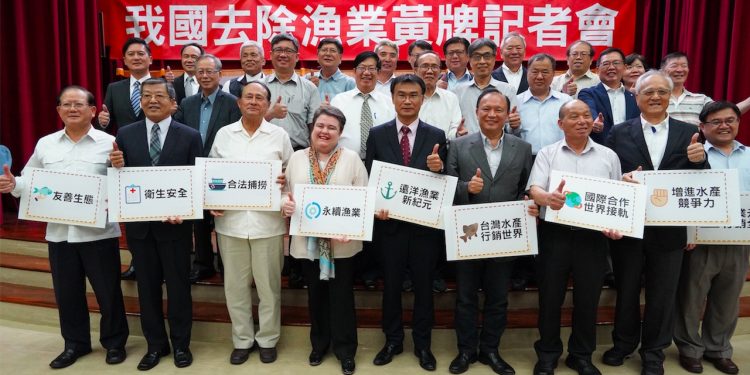The yellow card warning handed to Taiwan in October 2015 by the European Commission has been lifted, in recognition of the efforts made to strengthen legal framework, monitoring, control and surveillance (MCS), traceability, and international co-operation in fisheries.
As part of the decision to lift the yellow card, an agreement has also been made to establish a Taiwan/EU working group on combating IUU fishing to deepen collaboration and to ensure the legitimacy and traceability of fisheries products.
The removal of the yellow card ensures that Taiwan’s fisheries products can be exported to the European Union.
Taiwan’s Council of Agriculture points out that, to enhance Taiwan’s fisheries management, the Council has engaged in consultation with relevant authorities and organisations for more than three years, with substantial progress made in four areas.
The three fisheries acts were adopted; the Act for Distant Water Fisheries, the amended Act to Govern Investment in the Operation of Foreign Flag Fishing Vessels, and the amended Fisheries Act.
In addition several implementing regulations and notices were drawn up, and came into force together with the three fisheries acts in January 2017.
According to the Taiwan Fisheries Agency, this reinforces the legal basis governing Taiwan’s distant water fisheries.
All distant water fishing vessels have been fitted with e-logbooks. A Fisheries Monitoring Center (FMC) working around the clock monitors the movement of Taiwan’s distant water fishing fleets.
A landing declaration scheme is implemented, with 32 foreign ports are designated where Taiwanese distant water fishing vessels are allowed to land or transship only at those ports.
More fisheries inspectors have been recruited to reinforce inspection capacity. Port State measures are implemented on foreign vessels entering Taiwanese ports. More observers have been recruited to increase the coverage and meet international standards.
A Strategy Plan for Auditing Industry Related to Distant Water Fisheries was drafted and implemented, auditing and guiding exporters to ensure that fisheries products are not linked to IUU fishing.
Co-operation arrangements with 22 countries with high relevance to Taiwan in terms of fisheries were concluded. Taiwan’s compliance record within the regional fisheries management organisations (RFMOs) has been enhanced.
On track
In addition, the Executive Yuan set up a cross-ministerial task force on combating IUU fishing, to integrate and co-ordinate the capacities of relevant authorities, such as the ministries of foreign affairs, justice, economic affairs, finance, health and welfare, and labour, as well as the Council of Ocean Affairs and the Council of Agriculture.
The Council of Agriculture emphasises that the lifting of the yellow card means that Taiwan is on the right track and seafood companies can rest assured of the legitimacy and traceability of fisheries products originated from Taiwan.
‘Taiwan will not be self-complacent and lax about its management measures,’ a council spokesman said.
‘In future, Taiwan will continue collaborating with like-minded partners like the EC and fisheries related organisations, and participate proactively in RFMOs, so as to carry out related international rules and fulfil its duties under the international law. It is believed that, with concerted efforts, the world can win the fight against IUU fishing and ensure the sound marine ecosystem and sustainability of fisheries.’









